Essential Preservation: Choosing the Right Mortuary Cooler
For funeral home directors seeking reliable storage solutions, here are the top mortuary coolers currently available:
-
2-Body Roll-In Cooler (AMC #2BR) - $6,905
- Self-contained with no drainage required
- Plugs into standard 110V outlet
- 15-year panel/door warranty
-
3-Body Oversized Mortuary Cooler - $7,611
- Extra-wide design for larger remains
- Digital temperature control with LED display
- Made in USA with EISA-compliant panels
-
CoolBot Walk-In DIY Solution - ~$5,000
- Converts standard air conditioner into cooler
- Maintains 37-38°F consistently
- WiFi temperature alerts available
-
4-Body Upright Mortuary Cooler - $9,000+
- Chrome-plated hardware for durability
- Digital thermometer and temperature controller
- Multiple floor overlay options available
Top mortuary coolers are essential equipment for funeral homes, hospitals, and morgues that provide dignified preservation while ensuring compliance with health regulations. These specialized refrigeration units operate at precise temperatures between 36°F and 39°F to slow decomposition, giving families time to make arrangements.
Modern coolers come in several configurations including body boxes, roll-in units, upright models, and walk-in chambers. The right choice depends on your facility's volume, available space, and budget considerations.
Quality coolers feature heavy-duty insulation with R-values ranging from 21 to 43, digital temperature controls, and durable construction. Many units are self-contained, requiring no special drainage or electrical systems beyond a standard wall outlet.
I'm Mortuary Cooler, a national-level supplier of top mortuary coolers with extensive experience helping funeral directors select the ideal preservation solutions for their unique facility requirements.
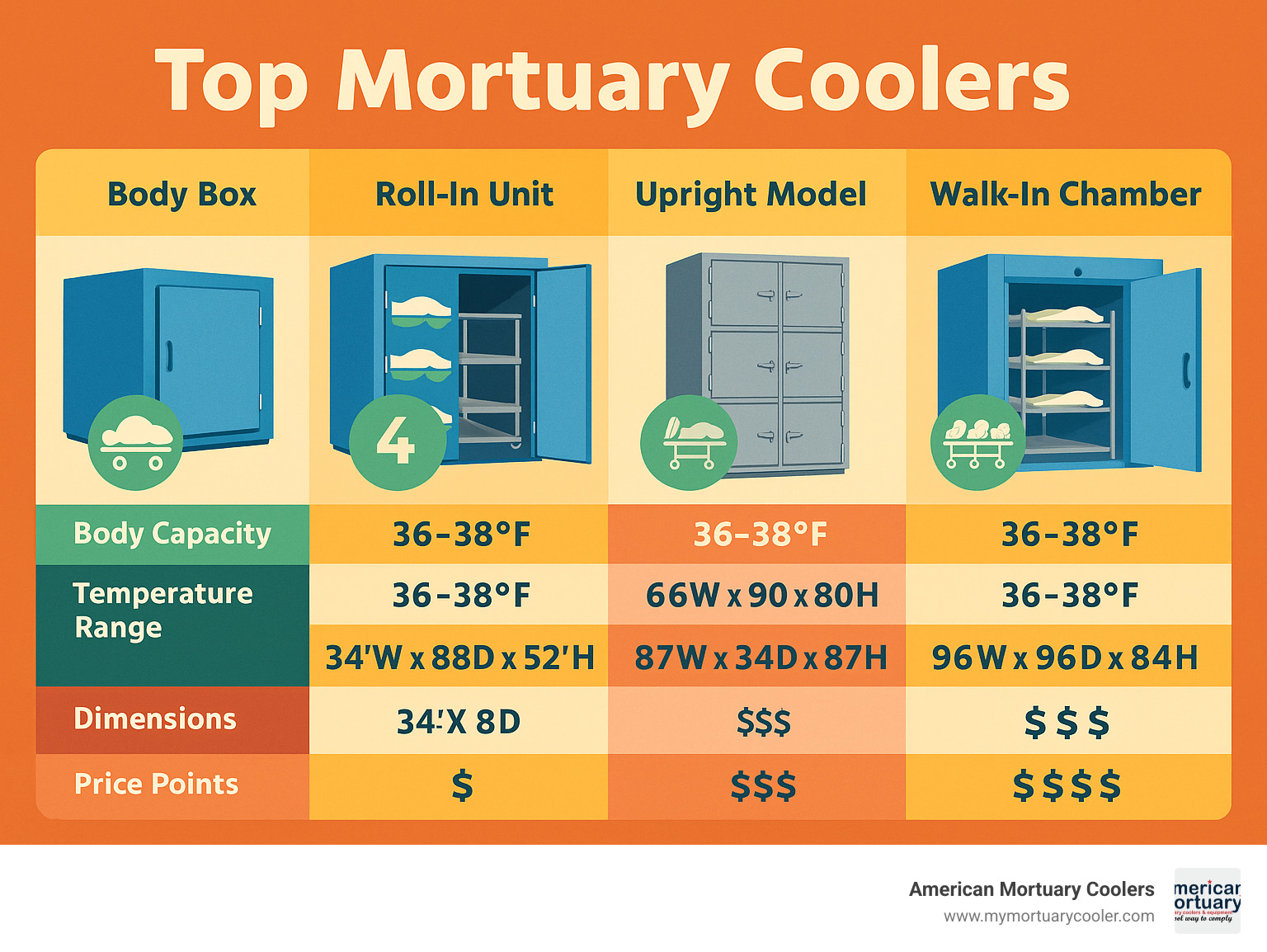
Glossary for Top Mortuary Coolers:
Understanding Mortuary Coolers: Types, Functions & Temperature Science
At American Mortuary Coolers, we've dedicated ourselves to perfecting the essential refrigeration systems that funeral professionals rely on daily.
The science of preservation is straightforward. Top mortuary coolers maintain temperatures between 36°F and 39°F (2-4°C) – not too cold to damage tissues, but cool enough to significantly slow bacterial growth. For special circumstances, freezer units can reach as low as –2°C, though standard refrigeration works perfectly for most situations.
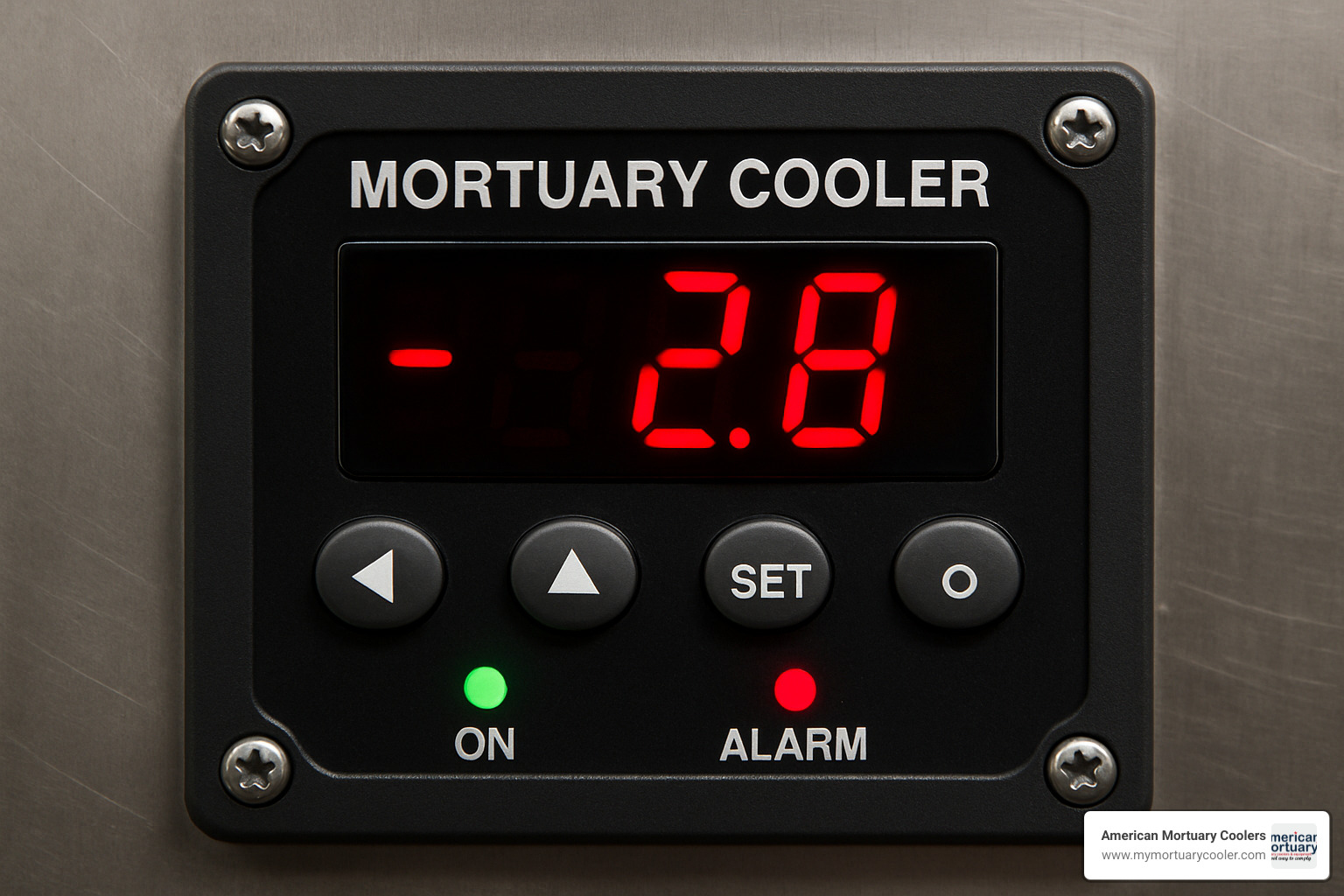
Quality mortuary coolers feature superior insulation measured by R-value, with panels ranging from R-21 in standard 3" body box panels to R-43 in 5-3/8" freezer panels. This translates to better temperature stability and lower energy bills.
Today's top mortuary coolers feature user-friendly digital controllers with alarm systems that alert staff if temperatures drift outside safe ranges. Newer models even connect to WiFi for remote monitoring. You can see these features in action on the American Walk-in Coolers YouTube channel.
Why They Matter in Funeral Homes, Hospitals & Morgues
Proper refrigeration preserves the dignity of those who have passed by maintaining their appearance until families can gather. This gives loved ones the precious gift of time to travel from afar and make thoughtful arrangements without rushing important decisions.
Top mortuary coolers protect public health by preventing decomposition while helping facilities meet strict OSHA regulations and local health codes.
Hospitals and medical examiners often need larger capacity units, while funeral homes typically require smaller, energy-efficient units that operate reliably year after year.
Main Cooler Styles Explained
Body Boxes are compact units typically holding 1-6 bodies, often with wheels for mobility. Perfect for smaller facilities or as backup storage, they plug into standard outlets and start around $6,000 for quality 2-body models.
Roll-In Coolers feature wide doors and floor-level access, allowing funeral directors to roll cots directly inside without additional transfers. This reduces handling and prevents potential staff injuries.
Upright Coolers maximize space efficiency with body trays that slide out horizontally, perfect for facilities where floor space is limited.
Walk-In Coolers serve larger operations with customizable designs that can accommodate up to 12 bodies, often incorporating shelving systems for organized storage.
American Mortuary Coolers specializes in creating custom configurations of each style, with successful installations across the country from our bases in Tennessee, Georgia, Illinois, and beyond.
Top Mortuary Coolers on the Market
The market typically divides coolers by capacity – how many deceased they can accommodate at once. You'll find 2-body, 3-body, 4-body, and 6-body configurations are most common, though custom solutions are available for unique situations.
One advantage of today's top mortuary coolers is that most are completely self-contained, requiring no external drainage, special plumbing, or complex electrical work – they simply plug in and start cooling.
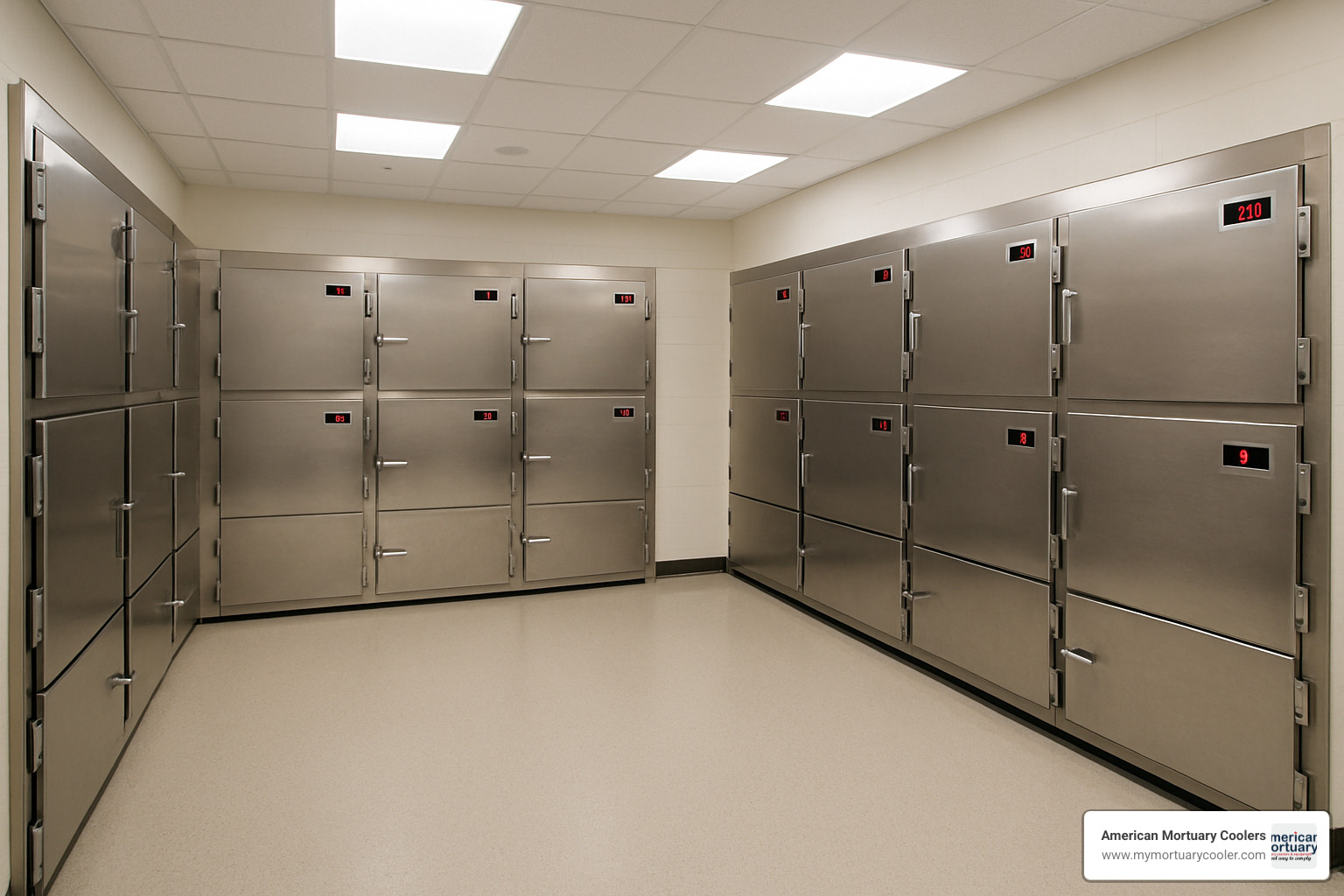
American-made coolers typically offer better quality and more comprehensive warranties than imported units. Most top mortuary coolers come with 15-year panel/door warranties and 5-year coverage on mechanical parts.
When comparing models, consider beyond the sticker price. A cooler with higher-quality insulation and more efficient cooling systems might cost more initially but can save thousands in operating costs over its lifetime.
Here's a helpful comparison of what's available:
| Model Type | Capacity | Footprint (W×D×H) | Price Range | Key Features |
|---|---|---|---|---|
| Body Box | 2-Body | 44"×94"×76" | $6,095-$6,905 | Portable, self-contained |
| Roll-In | 2-Body | 38"×94"×76" | $6,829-$7,500 | Accommodates standard cots |
| Upright | 3-Body | 57"×96"×96" | $7,611-$8,500 | Space-efficient design |
| Oversized | 3-Body | 57"×96"×96" | $8,500-$9,812 | Extra-wide for larger remains |
| High-Capacity | 4-Body | 76"×96"×96" | $9,000-$10,500 | Telescoping rails standard |
| Walk-In | 6+ Body | Custom dimensions | $12,000+ | Fully customizable |
Top Mortuary Coolers: 2-Body & 3-Body Stars
Smaller funeral homes often find that 2-body and 3-body coolers hit the sweet spot between functionality and budget.
Our bestselling AMC Model #2BR remains the champion in the 2-body category. Currently priced at $6,905, it offers tremendous value with generous interior dimensions and simple setup – most clients can assemble it in about an hour using basic tools.
For those on a tighter budget, the CoolBot DIY approach combines a CoolBot controller with a standard window air conditioner and insulated enclosure, creating a cooler that maintains a steady 37-38°F for around $5,000 total.
If you need more capacity, our 3-Body Standard Mortuary Cooler (AMC Model #3BR) provides 50% more space than 2-body models while keeping a reasonable footprint. At $7,611, it's an excellent value for growing funeral homes.
Top Mortuary Coolers: High-Capacity 4-Body to 6-Body Units
Larger funeral homes and medical facilities often need more substantial capacity. The 4-Body Upright Mortuary Cooler with telescoping rails (AMC Model #4BT) features a multi-tier storage system with individual access to each level and ergonomic body tray extraction.
For maximum capacity, our vault systems can accommodate 6 or more deceased through specialized shelving arrangements that optimize storage density – invaluable during unexpected surge events.
Walk-in coolers represent the highest-capacity option, with custom dimensions allowing for storage of 12+ bodies. These modular systems start around $12,000 and are particularly popular in medical examiner facilities and large metropolitan funeral homes.
Rapid-Deploy & Specialty Coolers
The COVID-19 pandemic highlighted the need for flexible, rapid-deployment cooling solutions. The innovative MERC System® uses direct contact liquid cooling, providing more efficient temperature management in a system that can be deployed rapidly during emergencies.
For temporary needs, our overflow container systems provide rentable solutions that can be delivered and operational within days. These modified shipping containers come equipped with complete walk-in cooler systems that can accommodate 20+ deceased.
Key Features & Specs to Compare Before You Buy
When investing in a mortuary cooler, understanding a few key factors will make all the difference in finding a unit that serves you well for years.
Insulation thickness is your first consideration – panel thickness ranges from 3" (with an R-value of 21) to 5-3/8" (R-43). While thicker panels cost more upfront, the energy savings add up month after month. Many clients find that upgrading to 4" panels pays for itself within 3-4 years.
Compressor capacity tells you how much cooling power you're getting. A standard 2-body unit typically needs around 2,610 BTUH, while larger systems might require 3,500+ BTUH. Facilities in hotter climates need more cooling power than those in cooler regions.
Don't overlook electrical requirements! Most smaller coolers run on standard 110V outlets, drawing 8-10 amps. But larger systems often need 208-230V service.
The lighting inside your cooler matters more than you might think. Modern top mortuary coolers come with LED lighting that's energy-efficient and provides better illumination for your work.
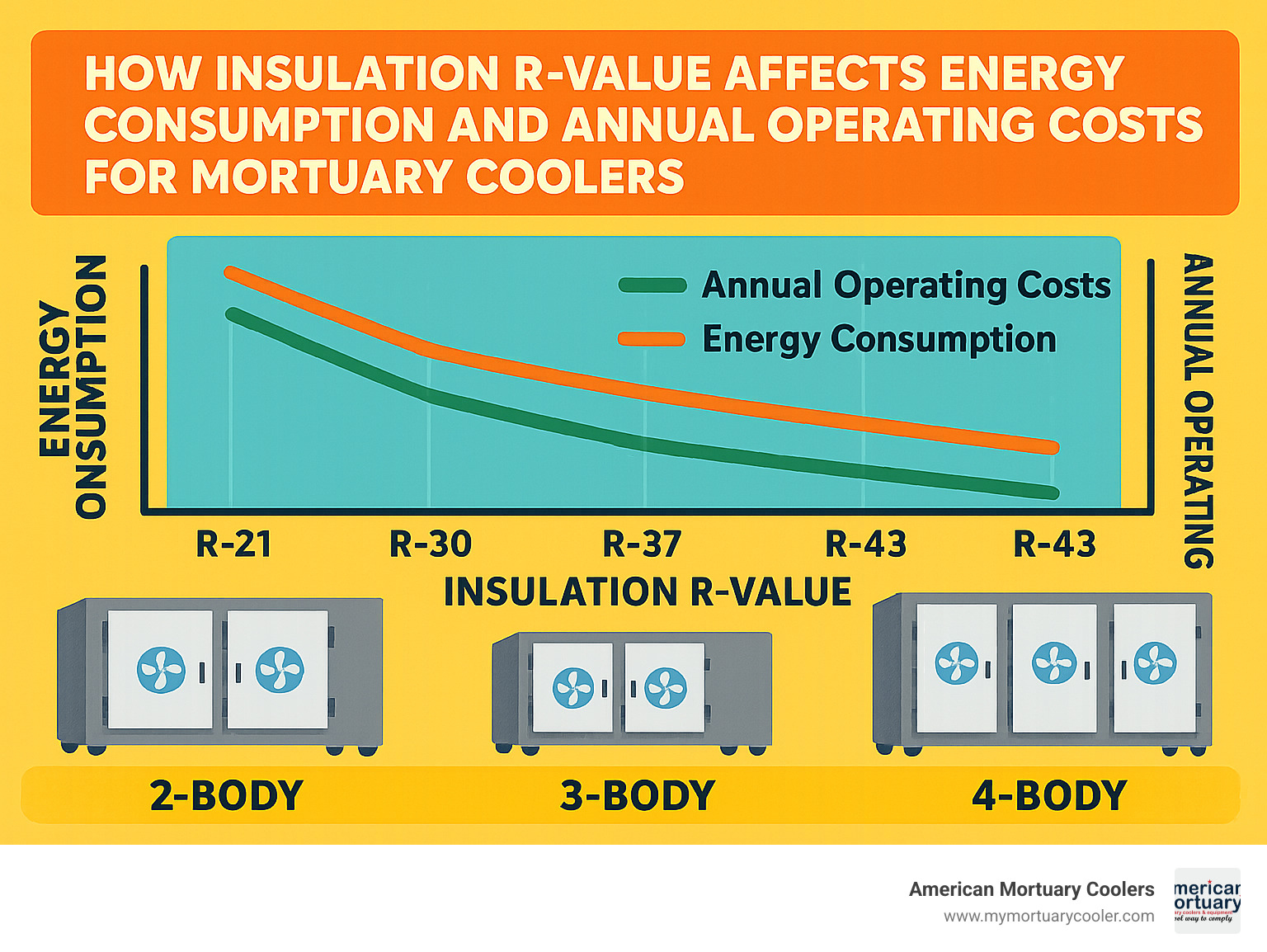
When it comes to warranties, the industry leaders offer 15 years on panels/doors, 5 years on mechanical components, and 2 years on labor. These comprehensive warranties reflect the manufacturer's confidence in their product.
Temperature Control & Monitoring
Today's top mortuary coolers use microprocessor-based PID controllers that maintain temperatures within ±1°C of your setpoint. They're constantly monitoring conditions inside the cooler and making tiny adjustments to keep things stable.
WiFi connectivity has been a game-changer, allowing you to receive alerts on your phone if temperatures drift outside acceptable ranges – even when you're away from the facility. The CoolBot Pro system is particularly impressive, sending real-time alerts and keeping a 30-day temperature history log.
For regulatory compliance, data logging capabilities provide peace of mind. When a health inspector or OSHA representative asks for temperature records, you can simply download a report.
Redundant sensors at different locations within your cooler ensure accurate readings throughout the storage area. If one sensor fails, the others continue working – a valuable backup system.
Construction & Durability Essentials
Hardware quality is something you'll appreciate every time you open and close the cooler door. Top mortuary coolers feature heavy-duty, chrome-plated hardware that stands up to constant use and harsh cleaning chemicals.
The interior materials make a huge difference in daily maintenance. Stainless steel (304 grade) interiors might cost more initially, but they clean up beautifully year after year.
High-quality neoprene rubber gaskets create airtight seals that keep cold air in and warm air out. They're the unsung heroes of energy efficiency, and on quality units, they're designed to be easily replaceable when they eventually wear out.
Floor construction deserves special attention based on your specific needs. Reinforced floors support heavy loads without sagging, while ramp thresholds make roll-in models truly practical.
Energy Efficiency & Operating Cost
Over 15 years, you'll likely spend more on electricity than you did on the cooler itself. The insulation type makes a significant difference in your monthly utility bills:
- A standard 2-body cooler with 3" EPS panels (R-21) typically costs around $650 per year to operate
- The same cooler with 4" PUR panels (R-28) runs about $520 annually
- Our premium model with 5-3/8" PUR panels (R-37.6) operates for approximately $410 per year
That $240 annual difference between basic and premium insulation adds up to $3,600 over a 15-year lifespan – often more than enough to offset the higher initial cost of the better-insulated unit.
Many utility companies offer rebates for energy-efficient refrigeration equipment. At American Mortuary Coolers, we help clients identify available incentives in their region.
Installation, Customization & Maintenance Best Practices
Even the best mortuary cooler won't perform properly without thoughtful installation and regular care. At American Mortuary Coolers, we guide you through the entire process, from delivery to years of reliable service.
Most customers choose "knock-down" panel kits that can be hand-carried through standard doorways and assembled on-site in about an hour using basic tools. For those with adequate doorway clearance and forklift access, fully assembled units provide the convenience of immediate use.
Door configuration significantly impacts your daily workflow. Right or left-hinged single doors work well in tight spaces, while double doors provide easier access when transferring remains.
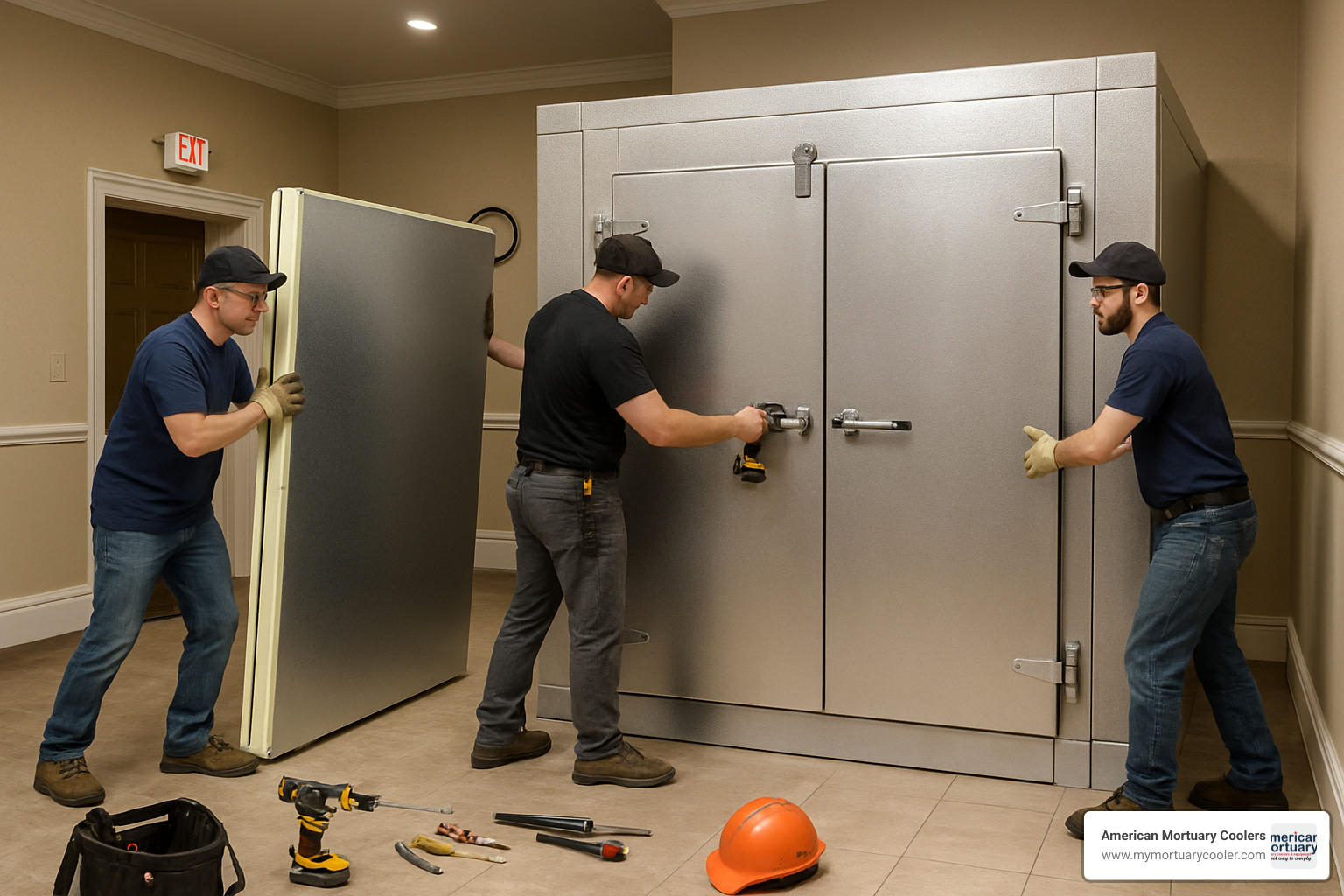
Flooring options include installing directly on existing concrete, standard floors for typical applications, or reinforced floors for heavy equipment. For roll-in models, ramp thresholds make transfers smooth and reduce staff strain.
Modern top mortuary coolers feature energy-efficient LED lighting, providing clear illumination while keeping energy costs down. Motion-activated options conserve even more energy, while external switches with indicator lights help staff confirm at a glance that systems are functioning properly.
Shipping & Site Prep Checklist
Before your top mortuary cooler arrives, work through this simple checklist:
- Measure doorways and compare them to cooler dimensions if receiving an assembled unit
- Check if your facility has a loading dock for assembled units
- Verify your electrical setup matches the cooler's requirements
- Ensure the installation location stays below 95°F with proper ventilation
- Prepare a level, clean floor surface strong enough to support the cooler
- For knock-down units, gather basic tools like screwdrivers, wrench, level, and tape measure
- Schedule staff to receive the delivery and inspect for any shipping damage
Our team provides customized site preparation guidelines specific to your chosen model and facility layout. We've helped funeral homes from Chicago to Los Angeles prepare for successful installations.
Ongoing Maintenance Schedule
A simple maintenance routine prevents costly downtime and extends equipment life.
Monthly maintenance includes checking temperature readings, inspecting door gaskets, cleaning interior surfaces, and verifying alarm systems are functioning properly.
Quarterly maintenance involves cleaning condenser coils to remove dust and debris, checking drain lines for blockages, inspecting hardware for corrosion, and testing backup systems.
Once a year, consider scheduling professional service for a comprehensive check of the refrigeration system, calibration of temperature controls, inspection of electrical components, and lubrication of moving parts.
Keep a maintenance log documenting all service activities and temperature records for regulatory compliance and warranty claims.
With proper care, our top mortuary coolers typically provide 15+ years of reliable service. American Mortuary Coolers offers service contracts covering regular maintenance across our service regions in the Southeast, Southwest, Midwest, and Northeast.
Budgeting & ROI: Prices, Financing & Long-Term Savings
Current market prices for top mortuary coolers typically fall within these ranges:
- 2-Body Models: $6,000-$7,500
- 3-Body Models: $7,500-$9,000
- 4-Body Models: $9,000-$10,500
- Walk-In Custom Units: $12,000+
These prices reflect high-quality American-made units with comprehensive warranties. While imported options may offer lower initial prices, they often lack the durability and support of domestic products.
Financing options have expanded in recent years, with many suppliers offering attractive terms:
- 0% down payment
- No payments for 90 days
- 60-month financing options
- Minimum credit score requirements (typically 600+)
When calculating return on investment, consider factors beyond purchase price:
- Energy costs over the expected 15+ year lifespan
- Maintenance requirements and associated expenses
- Potential downtime costs if using less reliable equipment
- Resale value at replacement time
A premium cooler with high-efficiency insulation might cost $1,500 more initially but save $240 annually in energy costs. Over a 15-year lifespan, this generates $3,600 in savings, more than offsetting the higher purchase price.
Some facilities may qualify for grant funding through rural development programs, public health emergency preparedness grants, energy efficiency incentive programs, or small business improvement funds.
Warranty & Support Comparison
Warranty coverage provides protection against unexpected repair costs and insight into the manufacturer's confidence in their product.
Panel and Door Warranty: Industry leaders offer 15-year coverage on structural components.
Mechanical Parts Warranty: 5-year coverage on compressors, fans, and other mechanical components is standard for premium units.
Labor Warranty: 2-year labor coverage is typical, covering the cost of repairs performed by authorized service providers.
Beyond the written warranty, consider these support factors:
Technical Support Availability: 24/7 phone support for emergency issues versus limited business hours can make a critical difference during system failures.
Parts Availability: American-made coolers typically offer better parts availability, with most components shipping within 24-48 hours.
Service Network: American Mortuary Coolers maintains service partnerships across our entire service area, ensuring prompt response from qualified technicians in Johnson City TN, Atlanta GA, Chicago IL, Columbia SC, Dallas TX, Los Angeles, New York NY, and Pittsburgh PA.
Documentation Quality: Comprehensive installation and operation manuals empower your staff to resolve minor issues without service calls.
Warranty coverage typically requires proper installation and maintenance according to manufacturer guidelines. Keep detailed records of all maintenance activities to protect your warranty coverage.
Frequently Asked Questions about Mortuary Coolers
How cold should a mortuary cooler be set?
The sweet spot for top mortuary coolers falls between 36°F and 39°F (2-4°C). This carefully calibrated range slows natural decomposition processes without freezing tissues, which could complicate embalming or affect appearance.
Think of it as the "Goldilocks zone" - not too warm, not too cold, but just right for preservation. Your digital controller should maintain this range with minimal fluctuation.
For certain special situations - perhaps forensic cases or when extended storage is necessary - freezer units at around –2°C might be appropriate. But for most funeral homes, standard refrigeration better preserves the condition of loved ones for viewing and services.
I recommend setting up both high and low temperature alarms (typically at 41°F and 34°F respectively) to alert your staff if temperatures drift outside the optimal range.
Can I install a cooler without a plumber or electrician?
Good news - most modern units can indeed be installed without specialized contractors! Our top mortuary coolers feature self-contained designs that require no external drainage or plumbing connections. Any condensation either evaporates automatically or collects in removable pans.
On the electrical side, our smaller units (2-3 body capacity) plug right into standard 110V outlets. All you need is a dedicated 15-amp circuit.
Assembly is equally user-friendly. Our knock-down kits come with detailed instructions that walk you through the approximately one-hour process using basic tools you probably already have.
For larger units requiring 208-230V service, I do recommend having an electrician make those connections. Similarly, while walk-in coolers feature modular designs for straightforward assembly, professional installation can be helpful.
What size cooler is right for a small funeral home?
For facilities handling around 100-150 cases annually, a 2-body cooler typically hits the sweet spot. This provides enough capacity for routine operations while offering flexibility for weekend coverage and occasional busier periods.
When thinking about the right size, consider your unique patterns. Look at your monthly case volume and identify when you tend to be busiest. Also think about how quickly families in your community typically schedule services.
Space considerations matter too. A typical 2-body roll-in cooler needs about 44"×94" of floor space, plus clearance for door opening.
Don't forget to consider your growth plans. If you're expecting to expand services in the next 5-10 years, selecting a slightly larger unit initially might be more cost-effective than upgrading later.
For funeral homes with tight spaces but occasional higher needs, I often recommend a 2-body primary cooler supplemented with a 1-body portable unit that can be brought in as needed.
Conclusion
Choosing the right mortuary cooler isn't just a business decision – it's about honoring your commitment to families during their most vulnerable moments. The top mortuary coolers combine reliable preservation technology with practical features that make your daily operations smoother and more efficient.
At American Mortuary Coolers, we've spent years crafting custom solutions for funeral homes just like yours. From our home base in Tennessee, we've grown to serve funeral professionals across all 48 contiguous states.
When evaluating which cooler is right for your facility, keep these essential considerations in mind:
First, think carefully about capacity and workflow. A 2-body roll-in might be perfect for your small-town funeral home, while a larger operation might need a 4-body upright or custom walk-in solution.
Construction quality makes all the difference in the long run. Those heavy-duty chrome hinges, thick insulation panels, and seamless stainless interiors are what separates a cooler that lasts 15+ years from one that needs replacement after just a few seasons.
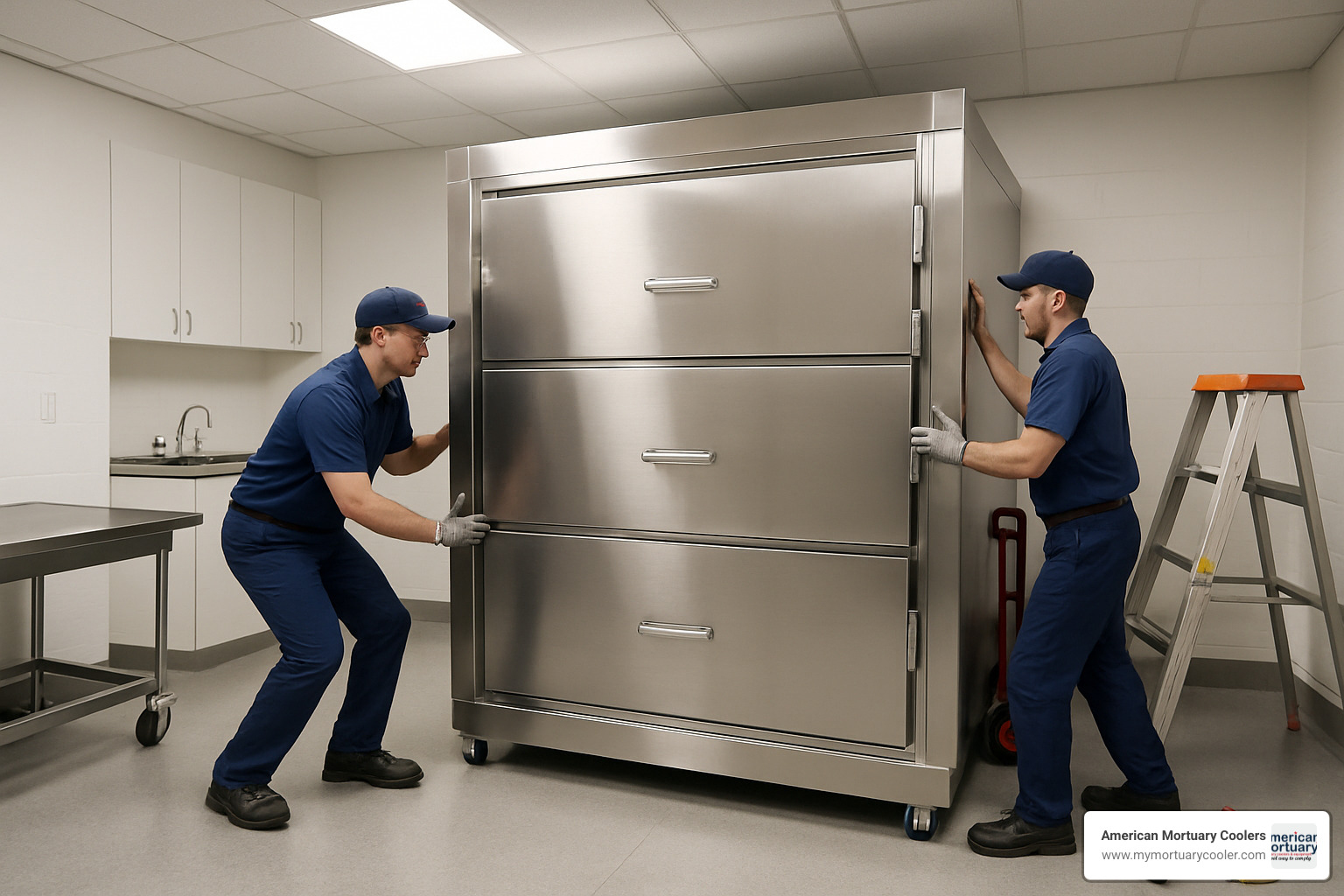
Energy efficiency matters more than you might think. Those extra inches of insulation and higher R-values translate directly to lower electric bills month after month, year after year.
Warranty coverage tells you exactly how much confidence a manufacturer has in their product. We stand behind our coolers with some of the industry's best protection: 15 years on panels and doors, 5 years on mechanical components.
We understand that behind every technical specification is what really matters: providing dignified care for the deceased and compassionate service to families during difficult times. The right cooler helps you fulfill that mission reliably.
Whether you're opening a new facility, renovating an existing one, or simply replacing aging equipment, we're here to guide you through the selection process. Our team serves funeral professionals across every region – from the Northeast to the Southwest, from the Midwest to the Pacific.
For personalized help finding the perfect mortuary cooler for your unique needs, reach out to our team today. The right cooler doesn't just preserve remains – it preserves your reputation for excellence and care when families need it most.



















